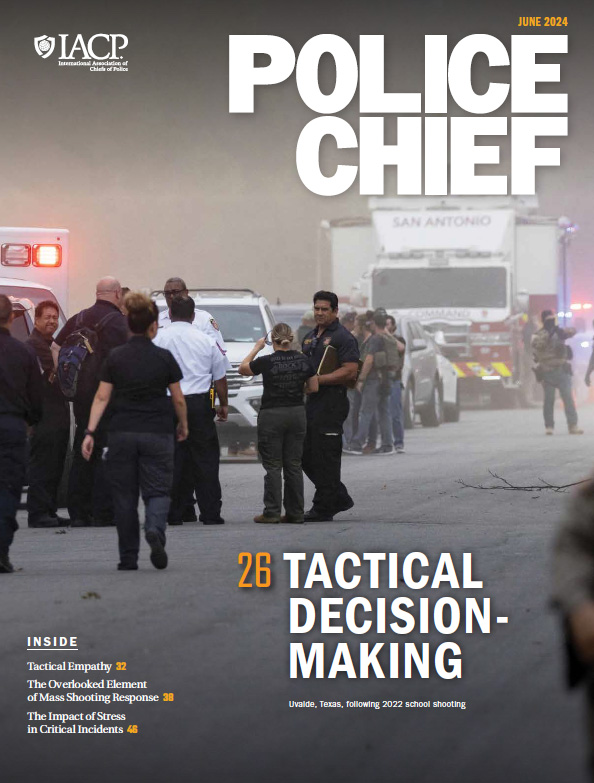When I first became a police chief, I was appointed interim chief at a packed city council meeting in Forest Park, Georgia, in October 2018. The only chief I had ever worked for had just been let go under extreme controversy. It was not a very ideal situation to find yourself in when becoming an agency head for the first time. I was definitely not prepared to effectively lead the organization, but I had no choice—it was time to get to work. Get to work was what I did. So much so, that I was working crazy hours, not eating meals, trying to be everywhere all the time. I was not going at a healthy pace, and because of that, there were a lot of things I could have done better.
The second time I became a police chief, I was taking over one of the most known and scrutinized police departments in the United States—Ferguson, Missouri, a city in turmoil and unrest following the shooting death of Michael Brown, by then-Ferguson police officer Darren Wilson. Once again, I was thrust into a challenging situation that, honestly, I was not prepared to handle.
By the time I stepped in to lead my third, and current, police department, another department facing controversy at the time, I had come to grips with the understanding that I was probably destined for a leadership journey marked by these types of challenges. At this point though, experience had taught me that I was prepared to handle the pressure and challenge of being a police chief. It also taught me that I needed to do a better job of leading and building up my command staff, so they felt better prepared for a challenging leadership journey, if their path ended up being similar to mine. While I do not recommend every aspiring police chief take on all the challenges that I did, the lessons learned have proven invaluable.
When leaders evaluate how well they are giving or pouring into others, the first place to start is to evaluate what they are pouring into themselves. True leaders never stop learning. Regardless of how much one has experienced, there is always another lesson to learn, another skill to sharpen, or new knowledge to obtain. Whether it’s a new technology in the profession, the latest social media platform, or a new software program that is coming on board within the agency, there is value in expanding one’s knowledge base. Success in the policing profession is tied to learning new things and adjusting as things change.
Some people argue that leaders are born, not made, but experienced professionals are likely to acknowledge that leaders are both born and made—some leadership qualities come naturally to people, while others take hard work to develop. Self-evaluation as a leader is key to the ability to mentor and develop others. No leader is perfect, but a strong leader is intentional about bringing out the best in those they lead. In order to accomplish this, the leader has to be in a good place to be able to effectively pour into their people.
A good visualization to understand the importance of this is a drinking glass pyramid, such as those that may been seen at a wedding or formal celebration. The success of the pyramid is contingent upon the glass at the top. If the glasses below are not aligned with the glass at the top, the liquid pouring out of that glass will not reach every glass in the stack. If the glass at the top is in alignment, not only will every other glass be filled, the glasses at each level of the pyramid will fill up at the same time. Alignment is critical here, but the key component goes back to the original question: what are leaders pouring into themselves? If one is committed to all the great qualities that make an organization successful, that is what will pour from that leader into the rest of the organization. To the contrary, if the leader is taking short cuts, emphasizing quantity over quality, and settling for mediocrity, those are the qualities that will pour into the rest of the organization. Taking the time to gauge what a leader is pouring into themself and making the needed adjustments or changes will benefit how that leader mentors those closest to them and the quality that spreads throughout the rest of the organization.
Unfortunately, one thing a lot of individuals have in common is the experience of having bad supervisors or leaders during their careers. Many people reading this have probably said or thought, “I had this one supervisor that was terrible, and I promised myself I would not be like that person when I became a supervisor.” Why do so many have that outlook on past supervisors? Were they really that bad? Perhaps some were, but most of them were probably okay overall, even if they had some bad moments. It is human nature for people to focus on the negative; that’s why news stations highlight the most tragic stories, and the positive stories get less attention.
“The leadership journey is not a sprint…”
One way to combat this focus on terrible supervisors is to stress the importance of connectedness. Leaders don’t get it right all the time; they’re not at their best all the time; and that is okay. Sometimes leaders fall short, and that is okay. What is not okay is to overlook how one’s shortfalls can have a lasting impact on their leadership moving forward. Building an organization of connectedness starts at the top. It’s important for leaders to recognize that they are not more important than anyone else in their police departments. Being the chief does not make a person more important than anyone else—being the chief means having more responsibility than others; that is it. Law enforcement leaders must focus on how they are perceived just as much as they focus on accomplishing the goals of the organization. As current leaders groom new supervisors and leaders in their organizations, they need to build in a culture of connectedness.
One way that Apex Police Department is doing new things in this area is through a pilot mediation program. The department has partnered with a local mediation service and when there are internal conflicts among staff, whether it is line staff to line staff or line staff to supervisor, mediation of the conflict is an option to try to resolve the issue. The theory is that bringing better resolve to internal conflict and having the ability to have these situations mediated by a neutral party will benefit everyone involved without laying blame to anyone for the conflict. The “dream” for policing is that, one day, there will be a group of law enforcement leaders having a casual conversation and one thing they will all have in common is that they all had positive examples of good leadership throughout their careers, which became their motivation for wanting to lead others.
In conclusion, being a leader is hard work. The higher one climbs, the more people are under their guidance. People are often complicated, which makes the job of leadership complicated. A leader will never be able to please everyone. People will often have a short memory of the good things and a lasting memory of the things that they did not like. So, why do it? The answer is easy, it’s needed. Regardless of what happens in society, there will never be a time when leaders are not needed. If leadership were easy, anyone would be able to do it. The beauty of leadership is how complex it is. That is also why mentorship is so important. Leaders should want to help grow new leaders and invest their time and abilities into those who seek growth.
The leadership journey is not a sprint, it’s not even a marathon, it’s an ultra-race—the epitome of grueling and rewarding. That’s leadership! d
Please cite as
Jason Armstrong, “Lessons in Leadership,” Police Chief Online, August 9, 2023.



